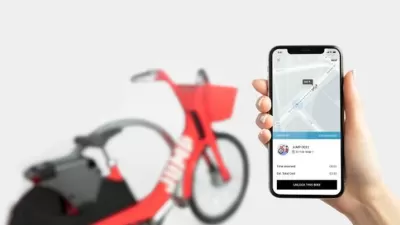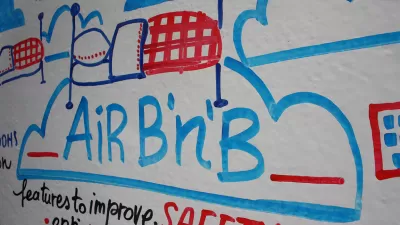The City of San Francisco announced this week that the numerous sharing economy companies headquartered in the the Bay Area will work with public officials to utilize their technologies in enhancing the city's disaster preparedness and response.
"Today Mayor Edwin M. Lee and Board President David Chiu announced a first-of-its-kind partnership between San Francisco’s growing sharing economy and local government focused on disaster preparedness and response," says a press release announcing the partnership. "BayShare, a collaborative of sharing economy stakeholders, will also share their skills and resources to make San Francisco a more resilient city."
"The sharing economy, also known as 'collaborative consumption,' uses technology and social media to promote the sharing and re-use of underutilized assets such as cars, bikes, tools, rooms, spaces, skills and other goods." Companies headquartered in the region include ZipCar, Airbnb, and Taskrabbit.
"One immediate outcome of this new partnership is the launch of BayShare member Airbnb’s new tool to quickly deliver housing assistance to displaced residents following a disaster," says the press release. "Inspired by the Airbnb community’s work to donate housing to victims of Superstorm Sandy, the tool will help provide free emergency housing to families in need in cities in every part of the world."
“Actual emergencies look more like people coming together than cities falling apart,” said San Francisco Department of Emergency Management (DEM) Executive Director Anne Kronenberg. “San Francisco’s recovery starts with the community and our partners that are there to lend a hand. We’re excited to have BayShare as one of our preparedness partners.”
FULL STORY: Mayor Lee & Board President Chiu Announce New Sharing Economy Emergency Preparedness Partnership

Study: Maui’s Plan to Convert Vacation Rentals to Long-Term Housing Could Cause Nearly $1 Billion Economic Loss
The plan would reduce visitor accommodation by 25,% resulting in 1,900 jobs lost.

North Texas Transit Leaders Tout Benefits of TOD for Growing Region
At a summit focused on transit-oriented development, policymakers discussed how North Texas’ expanded light rail system can serve as a tool for economic growth.

Why Should We Subsidize Public Transportation?
Many public transit agencies face financial stress due to rising costs, declining fare revenue, and declining subsidies. Transit advocates must provide a strong business case for increasing public transit funding.

How Community Science Connects People, Parks, and Biodiversity
Community science engages people of all backgrounds in documenting local biodiversity, strengthening connections to nature, and contributing to global efforts like the City Nature Challenge to build a more inclusive and resilient future.

Alabama: Trump Terminates Settlements for Black Communities Harmed By Raw Sewage
Trump deemed the landmark civil rights agreement “illegal DEI and environmental justice policy.”

Dear Tesla Driver: “It’s not You, It’s Him.”
Amidst a booming bumper sticker industry, one writer offers solace to those asking, “Does this car make me look fascist?”
Urban Design for Planners 1: Software Tools
This six-course series explores essential urban design concepts using open source software and equips planners with the tools they need to participate fully in the urban design process.
Planning for Universal Design
Learn the tools for implementing Universal Design in planning regulations.
City of Santa Clarita
Ascent Environmental
Institute for Housing and Urban Development Studies (IHS)
City of Grandview
Harvard GSD Executive Education
Toledo-Lucas County Plan Commissions
Salt Lake City
NYU Wagner Graduate School of Public Service





























